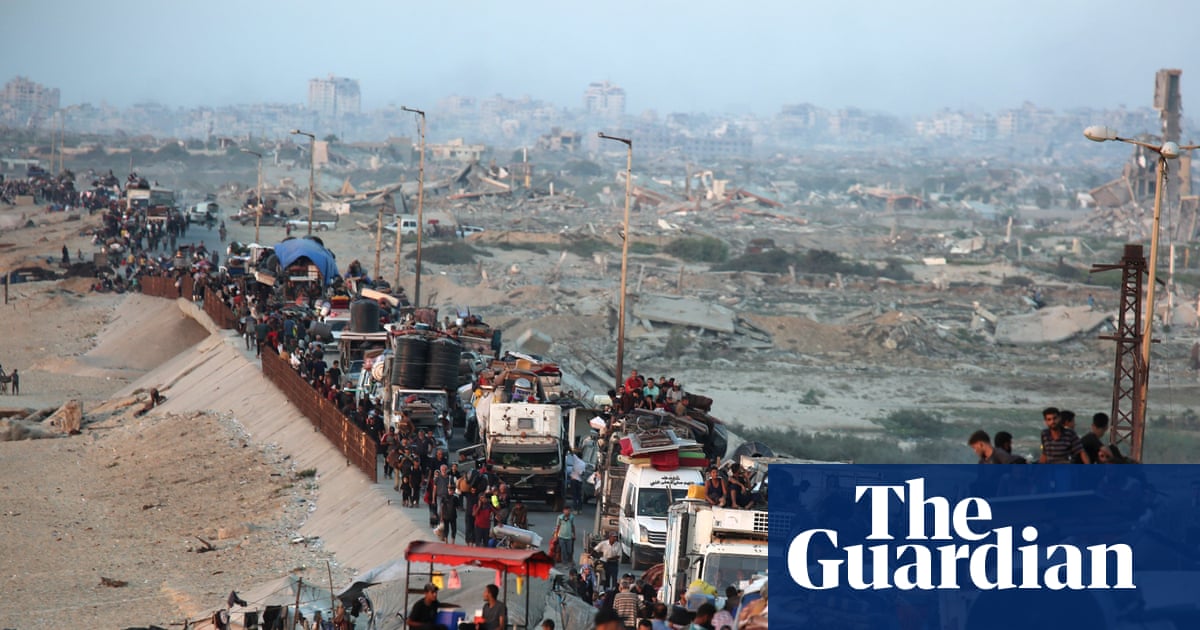Hamas has said it will review the outline of the Gaza peace plan presented by Donald Trump in Washington on Monday, as leaders across the Middle East and elsewhere voiced support for the proposal, which comes after almost two years of relentless violence.
In Israel, media and politicians broadly welcomed Benjamin Netanyahu’s announcement, made at a joint press conference with Trump, that he supported the 20-point plan, which meets many of Israel’s principal demands.
Hamas officials said they would discuss the proposal internally and with other Palestinian factions before responding.
A Hamas source told AFP news agency that the group had “begun a series of consultations within its political and military leaderships, both inside Palestine and abroad”, which would “take several days due to the complexities of communication among leadership members and movements”.
The 20-point plan calls for the disarmament of Hamas and bans it from any future political role in Gaza. It requires the militant Islamist organisation to release the 48 Israeli hostages it still holds – of whom fewer than half are thought still to be alive – within 72 hours of a ceasefire coming into effect, but offers the gradual withdrawal of Israeli military forces to a buffer zone along the perimeter and a surge in humanitarian aid, desperately needed by the 2.3 million inhabitants of the devastated territory.
It also requires Israel to release more than 1,000 Palestinian prisoners, including many serving life sentences.
Foreign leaders, painfully aware of the failure of multiple previous ceasefire efforts, rushed to offer support on Tuesday.
Germany’s chancellor, Friedrich Merz, said Trump’s plan was the “best chance for ending the war” while the French president, Emmanuel Macron, welcomed the US president’s “commitment to ending the war in Gaza and securing the release of all hostages”. Moscow also backed the proposal.
However, it is the support of regional powers such as Turkey, Egypt, Qatar and Jordan that will bring failure or success as they may be able to put pressure on Hamas to accept the proposal.
A Qatari official said Qatar would be meeting Hamas and Turkey on Tuesday to discuss the plan.
The Palestinian Authority, which exercises partial authority over parts of the Israeli-occupied West Bank but could be set for a role in a postwar Gaza government, welcomed Trump’s “sincere and determined efforts”.
However, Palestinian factions allied with Hamas appeared to reject the plan initially, according to local media reports, and a source close to Hamas told Reuters it was “completely biased to Israel” and imposed “impossible conditions” that aimed to eliminate the group.
Islamic Jihad, a Hamas ally, said the plan would encourage further aggression against Palestinians. “Through this, Israel is attempting – via the United States – to impose what it could not achieve through war,” the group said in a statement.
In Israel, many commentators welcomed the proposal and those usually supportive of Netanyahu were careful to highlight last-minute concessions they said the Israeli prime minister had obtained.
In a video statement posted on his Telegram channel after his joint press conference with Trump, Netanyahu said the military would stay in most of Gaza, and added that he had not agreed to a Palestinian state during his talks with the US president. “We will recover all our hostages, alive and well, while the [Israeli military] will remain in most of the Gaza Strip,” he said.
Far-right ministers, however, have vowed to quit the ruling coalition if Netanyahu halts Israel’s offensive in Gaza without achieving “total victory”. Bezalel Smotrich, Israel’s finance minister, said the plan was a “resounding diplomatic failure” that would “end in tears”.
Dr Ofer Guterman, an analyst at the Institute of National Security Studies in Tel Aviv, said Israel had changed its “paradigm” and now saw Arab states as potential partners. “Israel’s strategy had until now been based on a clash between Israel and Hamas to be handled basically through a military effort,” he said.
The pressure on Hamas to accept the deal will be intense. Pakistan, Jordan, the United Arab Emirates, Indonesia, Turkey, Saudi Arabia, Qatar, and Egypt on Tuesday issued a joint statement supporting Trump’s plan, and saying they were ready to work constructively with the US and others to secure peace.
The 20-point plan would in effect place Gaza under international control, deploy an international security force and instal a “board of peace”, headed by Trump and including the former British prime minister Tony Blair, to oversee the administration and reconstruction.
An international security force would keep order and train Palestinian police to take over law enforcement. Egypt has said it was training thousands of Palestinian police to deploy to Gaza.
In Gaza, Israeli forces continued their offensive, with tanks advancing further into Gaza City amid intensive bombardment of residential districts there. Nine people, including a woman and five of her children, were killed in two separate attacks in the central city of Deir al-Balah.
Deaths caused by hunger and malnutrition in Gaza have increased to 453, including 150 children, health authorities say. Famine was declared in parts of the territory last month.
The war began after Hamas’s attack on Israel on 7 October 2023 that killed 1,219 people, mostly civilians, and in which more than 250 hostages were taken.
Israel’s offensive has reduced much of Gaza to rubble and killed 66,055 Palestinians, also mostly civilians. More than 160,000 are thought to have been injured.
